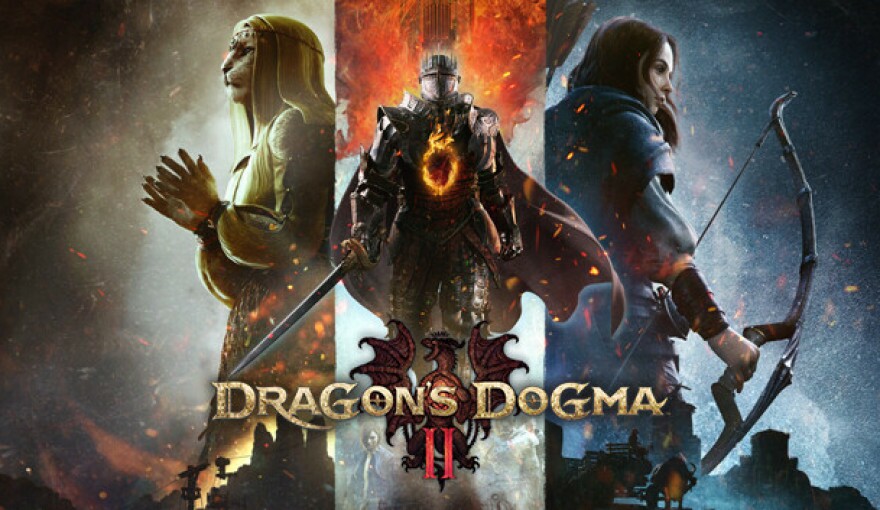
In Dragon's Dogma 2 you have to pay for literally everything: fast travel, resting in an inn, slow wagon rides, armor, upgrades, and more. If you can do something or desire something, you'll either have to pay for it, risk your life, or spend time searching for it. Talking about balance in RPGs and action games has never stopped. In Dragon's Dogma 2, the ideas of risk and reward apply to almost every moment of the game. Some gamers will find it excessive, fans of the original will be glad, but I will say this - fans of exciting and epic fantasy owe it to themselves to give this project a chance!
The original Dragon's Dogma was released in 2012, and a year later still re-released as Dragon's Dogma - Dark Arisen. The game was completely misunderstood, believing it to be an unfinished Skyrim clone or even a Dark Souls copycat. Understanding was not helped by poorly explained mechanics and a bunch of bugs. But since then, the popularity, respect and appreciation for the original and remaster has grown steadily. In retrospect, there have been so many bold innovations to this game that the initial reaction was fundamentally misguided.
Dragon's Dogma 2 is bigger, much more ambitious, looks incredible (most of the time) and is just as uncompromising as the original. Some RPG action fans will be pleased, while others will be saddened by the fact that the sequel doesn't have much help. The developer hasn't added any major changes to the invasion system from the world of Elden Rings. It's a game that many impatient gamers will give up on, but once it starts to make sense, it will literally grab you by the throat (trap you in the soul, if you will).
The narrative agenda is pretty straightforward. At least at first glance. A huge dragon threatens the world, and only a hero (the Risen or Risen), chosen by the dragon himself, can defeat him. There can only be one-the true Risen One. But an imposter sits in power, who sends you to a dungeon to avoid the dragon's destruction. You escape, and your main task is to take the place of the true Risen One and fulfill your destiny.
Dragon's Dogma 2's main quest starts out simple enough, but as you might expect, it breaks down into dozens of smaller, interconnected lines, propelling the player further and further across a map four times the size of the original. What's incredibly unique and often tense is that many side quests have a time limit and are completed whether the player chooses to intervene in events or not. If you spend too much time rescuing a lost child, the child will die. You have to be careful with such assignments and consider whether it's wise to take on even the smallest extra task. But the temptation is great, because you never know what or who you will meet on your way. That is, of course, if you manage to survive.
The map itself is minimalistic, containing quest markers for the main quests, indicating the general search area. Beyond that, the game expects gamers to discover locations and quests on their own. This is as far away as possible from what happens on open-world maps in Ubisoft games.
Survival in Dragon's Dogma 2 isn't just a matter of having enough healing potions or the help of a healer waving a magic wand. For one thing, that altruistic mage can only partially heal you. Each battle takes away a chunk of your overall health until you rest at a campfire or inn, which, by the way, costs either coins or a camping kit. And, of course, lots of healing potions will lead to overload and exhaustion.
Like all RPGs, Dragon's Dogma 2 is a high-powered fantasy in which fighters, mages, archers, and thieves fight with or against each other. There are four starting classes called professions, then the base professions are divided into four other specialized subclasses. To unlock a subclass, you almost always have to do one or another quest. Essentially, you are tied to a class from the moment you create your character, but the minor professions allow for some mixing and matching of skills, abilities, and abilities from other classes.
Dragon's Dogma 2 is, for the most part, a single player adventure. The reason I pointed this one out is that the player can hire pawns (companion-NPCs) - characters from other gamers (or even developers!). Each player character has a primary pawn, and can hire two additional, temporary ones. Pawns are everywhere, offer themselves in different locations, and can be hired in a sort of alternate dimension accessed through the Rift Stones.
The Pawns mechanic is the most innovative idea of the original game. In the future, the Pawns will become even more dynamic. They will fight, sarcasm, complain about each other (or just their plight), and compliment each other depending on their nature. Some are more autonomous than others. The player must grant them armor and weapons, and choose improvements and abilities for the main pawn. Pawns are easy to control in battle. However, even without your reverent attention, they fight quite autonomously and tolerably well.
The vast world of Dragon's Dogma 2 is one of the most dynamic, interesting and complex worlds ever created in gaming. Emergentism is achieved through pawns, a wide range of weapons and skills, intelligent use of the environment and enemy artificial intelligence, combat and exploration. The world is frenetic, demanding, and rarely predictable. Enemies often attack in groups, there are plenty of Monster Hunter-inspired bosses for you to climb. Traveling at night, in near total darkness, will be intimidating. Sure, you can light a fire to dispel the darkness. But that light will attract the attention of other monsters.
Visually, everything in Dragon's Dogma 2 is a massive leap forward from the first game, which is probably to be expected. That said, it's still not quite up to the latest standards, with a disappointing set of graphical settings to customize and a frame rate that only reaches 30fps on the PS5. Hundreds of characters and thousands of lines of dialog amaze more often than they disappoint, despite the decidedly poor lip-syncing and speech. Spell effects and lighting in general are incredibly well realized. Combat animations are still not perfect, which is most noticeable during the fiercer battles. There are still a lot of minor issues with the AI's behavior, and there are occasional bugs. Like when pawns refuse to follow orders. Or maybe they do it out of spite?
Comparing Dragon's Dogma 2 to Elden Ring is both inevitable and instructive. Both are large-scale open-world RPGs, and their narratives are also built on a foundation of Gothic mysteries and classical mythology without regard to origin. But while Elden Ring is a logical evolution of FromSoftware's two-pronged focus on accessibility and complexity, DD2 has little concern for how it will be received by "drop-in gamers". It plays by its own rules.
FromSoftware has made it nearly impossible to "misplay" Elden Ring. Almost every build or weapon will usually help a gamer kill one or another difficult enemy. On the other hand, ignoring Dragon's Dogma 2's in-game systems and trying to play it like the recent Soulslike won't work. Already starting with character creation, Dragon's Dogma 2 requires patience, understanding, and above all, decision-making skills. You will get one save for the entire game.
Warface launches the festive event Triumph in honor of Victory Day: the return of the PvP mode "Arsenal" and a new series of weapons.
The company hopes for a quick resolution to the problem.
FOSSiBOT, a brand founded in 2022 by a team of experts with over 10 years of experience, introduces F112 Pro 5G, the world's first eco-friendly rugged smartphone with a revolutionary approach to design and materials. After two years of development, the company releases a device that combines advanced technology, protection and a responsible attitude to nature.
He will be the last one for the game.



